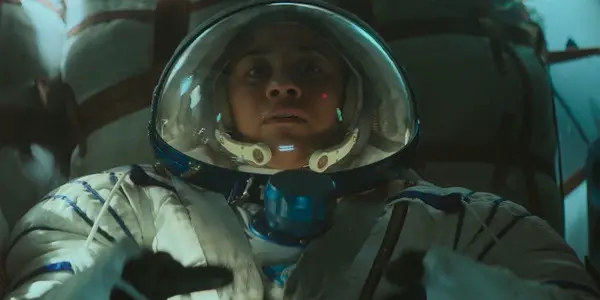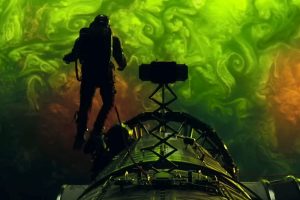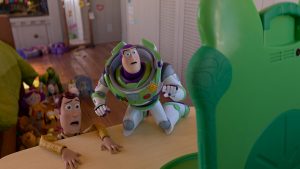
Space continues to hold our attention, even as we maintain a constant presence within it. It’s a remove from the world’s problems, a blank slate, an opportunity to be better than we’ve managed to be here on Earth.
That’s the basic tenant behind the I.S.S. and I.S.S., which imagines the American and Russian astronauts aboard the International Space Station sorting through orders and ethics while their countries wage war below. None of them are trained for battle, they have no weapons to speak of, and they don’t want to fight each other. But Earth is literally pulling them back into its orbit, and terrestrial battle lines are drawn.
It’s a good old-fashioned space thriller, with bouncing zero gravity scuffles and a whole lot of moral underpinnings. Standing out in this genre is difficult; there are only so many variations on close-quarters scrambling you can do, so I.S.S. chooses to stick to familiarity. That doesn’t make it the most eventful outing, but it’s a sturdy entry in the genre.
No Tricks
One of the strengths of I.S.S. is its simplicity. There are no aliens hunting the crew or any leering ne’re-do-well. It’s just astronauts (so scientists, basically), trying to size each other up. This starts before they get news from the ground because a newbie is in their midst, Ariana DeBose’s Dr. Kira Foster. It’s the oldest trick in the screenwriting book: bring a new character into an insular world so there’s an excuse for exposition. Each character introduces themselves and a tour is given of the space station, including the necessary items for survival (wink wink, they may be important later).
source: Bleecker Street Media
Familiar shortcuts like this are more perfunctory than annoying, as the point is to get to the action. More detrimental is when it speeds through twists, as if looking away quickly will distract from how obvious their outcomes are. There’s no sleight of hand here. Nick Shafir’s script is all building blocks plunked together, devoid of style.
Also missing is any whiff of political backbone. Perhaps the film was conceived before Russia invaded Ukraine and America amped up our involvement in wars and genocide. But it’s odd for a movie in 2024 to take such a firm middle road in geopolitical matters. Because the line in the sand for the six astronauts is not USA vs. Russia. It’s war versus peace. Do they follow the military orders each country sends? Or more specifically, who will be the soldiers and the pacifists on both sides? It’s an optimistic conundrum to envision, one that slightly deflates the film’s tension.
Turn of the Screw
The big appeals in space thrillers are claustrophobia and isolation, with each element ratcheting up already tense situations. The execution of this promise largely falls on the director, who must utilize every element of production to give the setting its due payoff. Here, that’s Gabriela Cowperthwaite, who broke out with the hit documentary Blackfish and has been making mediocre fictional films since.
There’s imagery in Blackfish that haunts to this day, and flashes of that appear again in I.S.S. The reveal of the war on Earth is particularly well done, as we only get glimpses at first through the small windows in the space station. It’s not until Chris Messina’s Gordon steps outside that the full destruction is revealed, and even then it’s rarely the focus of the frame. Mostly, Cowperthwaite relies on Messina’s face, desperately trying to hold it together as Earth looms as a blurry fireball behind him. The stakes are fully understood at this moment, both personally and situationally, and its impact stays through the interior seclusion of the rest of the film.
source: Bleecker Street Media
It’s these interiors that aren’t as well utilized, with the area inside the station appearing slightly too large when cramped quarters would’ve been more effective. Granted, the I.S.S. is relatively large in real life, but we bend reality for movies. Giving the American and Russian crews so much room to scheme undercuts the claustrophobia. A little fiction here would’ve gone a long way.
Actors Right the Ship
What never fails I.S.S. is the cast. It’s small, strictly covering the 6 people in the station. DeBose, Messina, and John Gallagher Jr. make up the American side while Masha Mashkova, Costa Ronin, and Pilou Asbæk play the Russians.
DeBose is the star here, and oddly it’s her first film role since winning an Oscar for West Side Story. Or perhaps it’s not that odd; she was an unknown before that film, and roles for women of color are few and far between. Despite headlining, she has less to do here than she did as Anita, but she carries things effortlessly. Her dancing background likely came in handy for stunt work, and she scales moments of emotion to match the film’s tension levels.
Messina and Gallagher Jr. are solid as always, although seeing the latter brings to mind the better claustrophobic thriller 10 Cloverfield Lane. The trio playing the Russians have incrementally less to do, but they make their characters into more than sneering villains, if only barely.
Character isn’t the focus of I.S.S., which is a shame since the actors are among its strongest elements. Their skill hides that several characters are simply meant to be grounded by paranoia, and without their personal touches, the film may have sunk below mediocrity.
CONCLUSION: I.S.S.
I.S.S. is a serviceable space thriller, one that remains light on ideas but sticks to sturdy tropes. There’s something infinitely satisfying about seeing people drawn to their base instincts while floating among mechanical sophistication. We never escape ourselves, the genre seems to say, and I.S.S. taps into that chilling reality just enough to be satisfying.
I.S.S. is in theaters on January 19th.
Does content like this matter to you?
Become a Member and support film journalism. Unlock access to all of Film Inquiry`s great articles. Join a community of like-minded readers who are passionate about cinema – get access to our private members Network, give back to independent filmmakers, and more.









